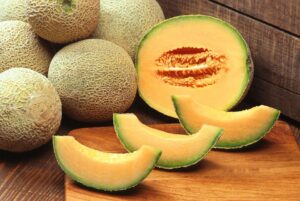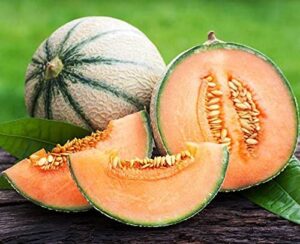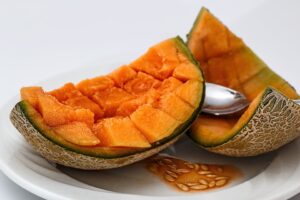Muskmelon vs. Cantaloupe: Explore Differences and Similarities of These Refreshing Summer Fruits, and Never Confuse Their Identities Again!
Muskmelons and cantaloupes are popular fruits often enjoyed in summer desserts and salads, offering a delightful and invigorating flavor and aroma. While it may be tempting to use these terms interchangeably, it’s crucial to recognize that muskmelons and cantaloupes are not one and the same. Let’s delve into the Differences and Similarities between these fruits and put an end to the Muskmelon vs. Cantaloupe debate once and for all.
Learn Kajari Melon Care in Pots and Garden
What is a MuskMelon?

The muskmelon is a delectable fruit belonging to the Cucurbitaceae family, which also encompasses vegetables like squash, pumpkins, and cucumbers. Its shape ranges from spherical to oval, featuring a firm, sleek, greenish-gray exterior. Inside, one can relish its delightful orange-yellow flesh, known for its pleasant sweetness.
Famous for its sweet and succulent flavor, muskmelon is frequently enjoyed in its fresh form or incorporated into salads, desserts, and refreshing beverages. This versatile fruit is also recognized by alternative names such as nutmeg melon, cantaloupe, and rockmelon.
In addition to its delectable taste, it boasts a commendable nutritional profile. Abundant in vitamins A, C, and B6, as well as essential minerals like potassium, magnesium, and calcium, the muskmelon serves as a wholesome source of nourishment.
What is Cantaloupe?

Belonging to the Cucurbitaceae family, which includes honeydew, watermelon, and cucumber, the cantaloupe is a variety of melons. This delightful fruit is highly favored during the summer season and is cherished for its luscious, juicy flesh and delightful sweetness.
Cantaloupe exhibits a pale green to orange-brown rind, encasing vibrant orange flesh. Known for its sweet, juicy nature and subtle musky flavor, this fruit offers a delightful taste experience. Furthermore, it boasts a nutritional profile abundant in vitamins A and C, along with dietary fiber.
Enjoyed fresh, incorporated into salads, or savored as a wholesome snack, cantaloupe is a versatile fruit. It finds its way into various culinary creations, such as smoothies, juices, and even baked goods.
Muskmelon vs. Cantaloupe: Differences and Similarities

When comparing muskmelon and cantaloupe, it’s important to note that they are actually different names for the same fruit. Muskmelon is a general term used to describe various melons that belong to the Cucumis melo species, including cantaloupe. Cantaloupe is a specific type of muskmelon, characterized by its pale green to orange-brown rind and orange flesh.
1. Family
Similarity: Both muskmelon and cantaloupe share several similarities. Firstly, they are both members of the Cucurbitaceae family, which includes other melons like honeydew and watermelon. This family is known for producing fruits with a high water content, making muskmelon and cantaloupe refreshing choices, especially during the hot summer months.
2. Appearance
Difference: Muskmelons, also referred to as netted melons, possess an oblong or round shape, accompanied by a light green, yellow, or orange outer skin.
Cantaloupes, in contrast, are round in form and feature pale yellow or light brown outer skin.
3. Size
Difference: In terms of size, the muskmelon is generally smaller compared to the cantaloupe. The muskmelon typically showcases a lighter green or yellowish-green rind, whereas the cantaloupe tends to have a darker and more vibrant green rind with distinct and deeper ridges.
4. Taste and Texture
Similarity: In terms of taste and texture, muskmelon and cantaloupe exhibit common features. Their flesh is typically sweet and juicy with a mild musky flavor.
This makes them enjoyable to eat fresh or incorporate into various culinary preparations. Both fruits are often used in salads, desserts, smoothies, and juices, as well as being consumed as a healthy and hydrating snack on their own.
Difference: While both muskmelons and cantaloupes boast juicy and sweet flesh, muskmelons tend to exhibit a heightened level of sweetness compared to cantaloupes. Additionally, muskmelon carries a subtle hint of cucumber-like flavor, adding a unique element to its taste profile, while cantaloupe delivers a more traditional melon flavor.
5. Smell
Difference: Both muskmelon and cantaloupe share a sweet flavor profile, yet they possess distinct nuances. Muskmelon offers a slightly fuller and richer taste compared to cantaloupe. Moreover, muskmelon carries a subtle hint of cucumber-like flavor, which adds a unique element to its taste profile. On the other hand, cantaloupe exhibits a more traditional melon flavor, distinct and characteristic of this variety.
6. Cuisines
Similarities: Muskmelon lends itself well to a variety of culinary creations, including salads, smoothies, juices, and desserts. Its versatile nature allows it to be incorporated into a wide range of dishes, adding a burst of flavor and sweetness.
Cantaloupe, on the other hand, is commonly used in salads and desserts, where it’s refreshing taste and vibrant color can enhance the overall appeal of the dish. Additionally, cantaloupe can also be served as a standalone side dish, showcasing its natural deliciousness.
7. Health Benefits

Muskmelon:
- Muskmelon has high levels of essential vitamins A, C, and antioxidants, offering potential defense against cancer and various chronic illnesses.
- This fruit is abundant in potassium, aiding in the regulation of blood pressure and decreasing the likelihood of stroke.
- It has a significant amount of fiber, supporting a healthy digestive system, reducing cholesterol levels, and facilitating weight management.
- Muskmelon contains folate, a nutrient that helps in preventing birth defects and lowering the risk of specific cancer types.
Cantaloupe:
- Cantaloupe has a high content of vitamins A and C, popular for its potential to safeguard against cancer and other chronic ailments.
- It is rich in potassium, which helps in regulating blood pressure and lowers the chances of stroke.
- This fruit is a valuable source of fiber. It is also famous for its ability to support healthy digestion, reduce cholesterol levels, and assist in maintaining a healthy weight.
- Abundant in beta-carotene, cantaloupe can play a significant role in enhancing the immune system and promoting optimal vision.
Find Is Pineapple a Berry or Citrus Fruit?
Muskmelon vs. Cantaloupe

Both of them, belonging to the melon family, are distinct varieties. Muskmelon encompasses a range of melons, including cantaloupes, honeydews, casabas, and Crenshaws.
Cantaloupe, a variety of muskmelon, is characterized by its sweet flavor and light orange flesh. Distinguished by its netted pattern, cantaloupe possesses a light orange rind, while muskmelon is identifiable by its bright green rind.
Muskmelon surpasses cantaloupe in water content, resulting in its juicy and sweet nature. Cantaloupe, on the other hand, offers a softer texture and is frequently included in fruit salads. Both fruits excel in fiber content and serve as excellent sources of vitamins A and C.



